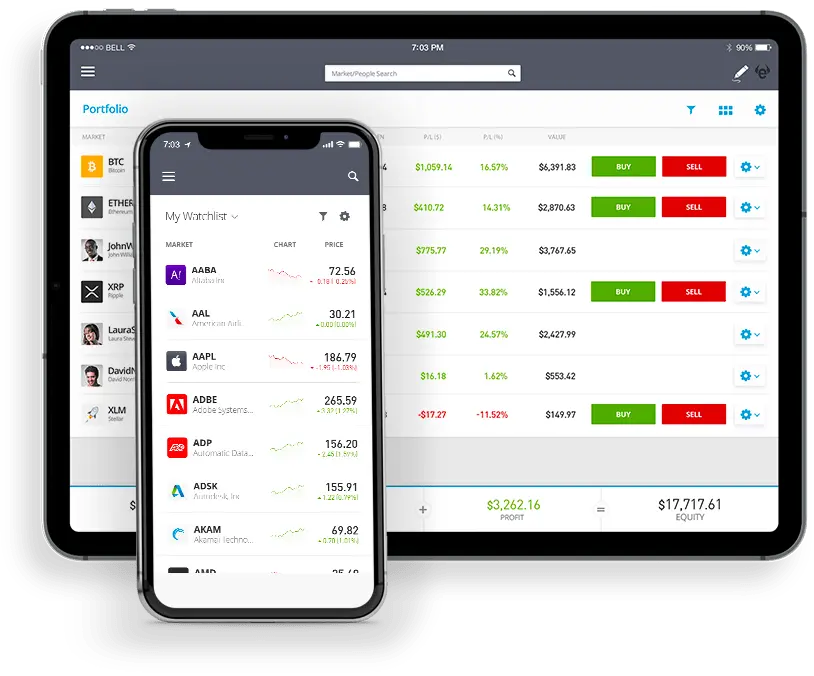Yes, eToro is regulated in the US. The platform is provided by eToro USA LLC, a registered Money Services Business (MSB) with the Financial Crimes Enforcement Network (FinCEN) and complies with state-level regulations. Additionally, eToro adheres to the regulations set by the SEC and FINRA in the United States, ensuring a regulated and secure trading environment for users.
Open USA account!
eToro USA LLC; Investments are subject to market risk, including the possible loss of principal, "Virtual currencies are highly volatile. Your capital is at risk."
Setting the Scene
eToro, a globally recognized online trading platform, has gained popularity for its unique approach to social trading. If you're a US resident interested in trading on this platform, you may wonder if it's regulated in your country. As someone deeply interested in this platform, I decided to dig into its regulatory status in the USA.
Understanding Regulatory Compliance
In the financial world, regulatory compliance is crucial. It ensures that trading platforms operate within the boundaries set by the law, providing security and transparency to users. Regulatory compliance is a fundamental aspect of the online trading industry, and eToro takes it seriously.
🏛️Why does regulatory compliance matter? It's the backbone of trust in the financial world. It ensures that trading platforms adhere to strict rules and regulations, offering users a secure and transparent trading environment.
eToro's Regulatory History
When eToro ventured into the US market, they aimed to provide American traders with access to a global marketplace of assets and opportunities. However, this journey involved navigating the intricate regulatory landscape of the USA.
Regulatory Bodies in the USA
In the United States, financial activities are closely monitored and regulated by the SEC (Securities and Exchange Commission) and the CFTC (Commodity Futures Trading Commission). These regulatory giants ensure that trading platforms like eToro operate fairly and securely, which adds a layer of trust for traders like me.
eToro's Licensing and Registration
Here's the good news: eToro USA took substantial steps to operate legally in the United States. They secured the necessary licenses and registrations required to provide their services to US residents. This includes rigorous compliance with SEC and CFTC regulations, which is reassuring for traders concerned about safety and legality.
So What are the Benefits of Regulation for Traders?
Regulatory compliance might not interest you, but it actually offers several advantages for traders, such as:
- Protection of our funds and assets.
- Assurance of fair and transparent trading practices.
- Robust security measures to safeguard personal and financial data.
- An even playing field for all traders, regardless of experience.
Challenges of Regulation
While regulatory compliance is essential, it can also present challenges for trading platforms. These challenges include the cost of compliance, the need for continuous monitoring and adaptation to changing regulations, and the potential limitations on certain trading features.
As for eToro, I learned that the platform that they provide for USA residents is different from the one that is being accessed by traders from other countries. For example, eToro USA traders can only access the following assets:
In comparison, the eToro's financial instruments for non-US residents are more diverse and this includes the following:
- Forex
- Stocks
- Commodities
- Indices
- Crypto
- ETFs
Staying Informed About Recent Regulatory Developments
In the fast-paced world of online trading, staying informed about recent eToro regulation updates is crucial. It helps traders like me adjust our strategies and ensure compliance with the latest regulations affecting eToro's operations in the USA.
Wrap-Up
The bottom line? eToro is indeed regulated in the USA. They've put in the effort to comply with the SEC and CFTC regulations, ensuring a safe and secure trading environment for US residents. As you explore eToro's platform, you can trade with confidence, knowing that the platform operates within the bounds of the law.
Cryptocurrency is offered by eToro USA LLC (“the MSB”) (NMLS: 1769299) and is not FDIC or SIPC insured. Investing involves risk, and content is provided for educational purposes only, does not imply a recommendation, and is not a guarantee of future performance. [website domain name] is not an affiliate and may be compensated if you access certain products or services offered by the MSB.


